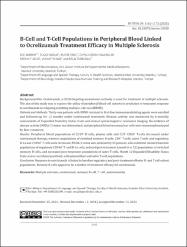B-Cell and T-Cell Populations in Peripheral Blood Linked to Ocrelizumab Treatment Efficacy in Multiple Sclerosis

Göster/
Erişim
info:eu-repo/semantics/openAccessTarih
2025Yazar
Akbayır, EceKızılay, Tuğçe
Erol, Ruziye
Özkan Yaşargün, Duygu
Tüzün, Erdem
Yılmaz, Vuslat
Türkoğlu, Recai
Üst veri
Tüm öğe kaydını gösterKünye
Ece, A., Tugce, K., Ruziye, E., Duygu, O. Y., Erdem, T., Vuslat, Y., & Recai, T. (2025). B-Cell and T-Cell Populations in Peripheral Blood Linked to Ocrelizumab Treatment Efficacy in Multiple Sclerosis. In Vivo, 39(2), 1162-1172.Özet
Background/Aim: Ocrelizumab, a CD20-targeting monoclonal antibody, is used for treatment of multiple sclerosis. The aim of this study was to explore the utility of peripheral blood cell subsets in prediction of treatment response to ocrelizumab in relapsing remitting multiple sclerosis (RRMS). Patients and Methods: Thirty-one patients with RRMS resistant to first-line immunomodulating agents were enrolled and followed-up for 12 months under ocrelizumab treatment. Disease activity was monitored by 6-monthly assessments of Expanded Disability Status Scale and cranial-spinal magnetic resonance imaging. No evidence of disease activity (NEDA-3) status was determined, and peripheral blood mononuclear cells were immunophenotyped by flow cytometry. Results: Peripheral blood populations of CD19+ B-cells, plasma cells and CD3'CD20' T-cells decreased under ocrelizumab therapy, whereas populations of switched memory B-cells, CD4' T-cells, na & iuml;ve T-cells and regulatory B-1a and CD49d' T-cells were increased. NEDA-3 status was achieved by 19 patients, who exhibited elevated baseline populations of regulatory CD49d' T- and B-1a-cells, reduced post-treatment (month 6 or 12) populations of switched memory B-cells, and increased post-treatment populations of na & iuml;ve T-cells. Month 12 Expanded Disability Status Scale scores correlated positively with plasmablast and na & iuml;ve T-cell populations. Conclusion: Response to ocrelizumab is linked to baseline regulatory and post-treatment effector B- and T-cell subset populations. Memory B-cells appear to be a marker of treatment efficacy for ocrelizumab.
















